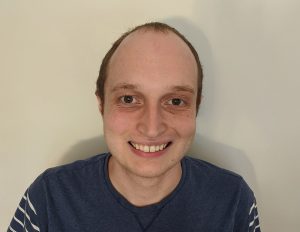What is your background education and work experience?
I graduated from Southern Illinois University Edwardsville with a Bachelor of Arts in History, with a minor in Computer Science. I was also the first SIUE student to receive an additional minor in Digital Humanities and Social Sciences. In undergrad I worked on a variety of digital humanities projects with the IRIS Center for the digital humanities, and after graduating I was hired as the technician for the IRIS Center. In that role, I was responsible for supporting the technical needs of digital humanities projects affiliated with the IRIS Center and provided guidance to professors and students starting their own digital scholarship projects.
What led you to your field?
I have been drawn to applied humanities, particularly history, since high school, and I have long enjoyed tinkering with software and making information available online. When I was young this usually manifested in reading and writing information on fan wikis. More recently, I have particularly enjoyed working on digital archives that focus on local community history, such as the SIUE Madison Historical project at madison-historical.siue.edu.
What are your favorite projects you’ve worked on?
While working for the Scholarly Commons, I have had the opportunity to work with my fellow graduate assistant Mallory Untch to publish our new podcast, It Takes a Campus, on iTunes and other popular podcast libraries. Recently, I recorded and published an episode with Dr. Ted Underwood. Mallory and I also created an interactive timeline showcasing the history of the Scholarly Commons for the unit’s tenth anniversary last fall.
What are some of your favorite underutilized Scholarly Commons resources that you would recommend?
We offer consultations to patrons looking for in-depth assistance with their digital scholarship. You can request a consultation through our online form!
When you graduate, what would your ideal job position look like?
I would love to work as a Digital Archivist in some form, responsible for ensuring the long term preservation of digital artifacts, as well as the best way to make these objects accessible to users. It is especially important to me that these digital spaces relate to and are accessible to the people and cultures represented in the items, so I hope I am able to make these sorts of community connections wherever I end up working.


